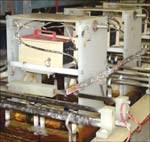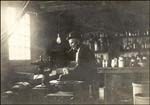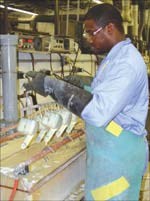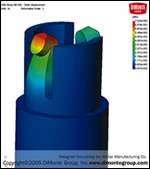Striking Gold
In spite of fierce competition from China, a sour economy and a devastating fire, Klein Plating Works, Inc. has managed to remain competitive, thanks to a combination of tight process controls and successful customer relationships…
Joe Dudenhoeffer likes to joke about the popularity of his last name in Western Pennsylvania. "I'll travel occasionally for my job, and it's extremely rare that I come across the ‘Dudenhoeffer' name," says the sales and marketing manager of Erie, PA-based Klein Plating Works, Inc. (KPW). "But here, that name seems to be everywhere. People will hear the name and ask me if I'm related to this person or that person, and it'll turn out that there's absolutely no relation whatsoever."
| Frank Klein, KPW founder |
It was Dudenhoeffer's great grandfather, Frank Klein, who founded KPW—then known as Erie Gold & Silver Company—in 1915 as a supplier of polished and nickel plated components to the stove manufacturing and hospital equipment industries. Half of Klein's shop was also devoted to cigar-rolling, a trade popular with German immigrants. Over time, he phased out of the cigar industry and expanded the business from just refurbishing antiques, lamps and flatware to learning and establishing plating for electronics with Erie Resistor Corporation.
When the United States entered World War II in 1942, KPW briefly shifted its focus to silver plating of electrical components. Though the company returned to polishing and decorative work after the war, the experience that it had gained as a result of the industrial work would play an important role in the company's future.
By the 1960s, with the seven-man job shop struggling to keep its doors open, Larrie Dudenhoeffer—Klein's grandson, and the company's current president—suggested that KPW explore new avenues for its plating expertise. He traveled to Warren, PA to meet with a representative from a large semiconductor manufacturer and returned with the company's first account for the electronics industry…and with it, the start of a new chapter in the company's history.
 |
| Small load sizes, low- current densities and more delicate parts handling equipment are common in gold and silver plating. |
Today, with more than 50 employees on staff, Klein Plating Works focuses almost exclusively on industrial plating for the electronics and power industries. Although silver and gold plating comprise the majority of its service offerings, the company also offers nickel, electroless nickel, tin, tin-lead and copper plating. Other services include bright dipping, buffing and polishing, deburring, etching, passivating and chromate conversion coatings.
Special Finishes, Special Challenges
Both Dudenhoeffer and Mike Ricci—KPW's administrative manager—say that while plating with precious metals affords them special opportunities, it also poses some unique challenges.
"When you're talking about plating for electronics, you're generally talking about smaller load sizes, more delicate parts handling equipment and tighter tolerances," says Ricci. "These parts have very detailed specifications and demand a high degree of reliability, so being able to consistently produce a quality finish can be challenging."
 |
| Plating Technician Thronwell "Thorny" Tyes removes parts from a bright tin bath. |
To that end, KPW relies on a combination of barrel, rack, reel-to-reel and vibratory plating combined with years of learned secrets. Even though many of the parts it plates may serve similar functions, KPW's technicians take a fresh approach to each job that comes through the door. For instance, though barrel plating may be the best fit for a job from a volume standpoint, a technician may rely on another method if it will yield a better quality finish. "KPW is not about producing the most, it's about producing the best," according to Dudenhoeffer.
Another challenge of precious metals plating is the cost of the materials themselves. With the price of gold reaching highs as great as $500 per troy ounce in the last year, efficiency becomes absolutely critical. "The last thing you want when you're working with gold and silver is rejects," says Dudenhoeffer.
When it comes to minimizing rejects and making the most of its materials, KPW relies on a combination of tight process controls, a quality system registered to ISO 9001:2000 and a knowledgeable, experienced staff—many of whom have been with the company for 25 years or longer. "Many of our staff members can remove a part from a plating bath and immediately identify whether a part is acceptable or not. If it isn't, they usually know exactly where in the process the problem lies," says Ricci. "It's good to have people who know the process, know what to look for and know where to go when they see a problem."
 |
| Quality Assurance Supervisor Len Zielinski prepares plated parts for thickness testing, using an x-ray fluorescence system. |
KPW's Quality Assurance Department also plays a key role in minimizing rejects. There, the staff uses a variety of tools and techniques to test plated parts for solderability, electrical resistance, appearance, coating thickness, stress and embrittlement and other characteristics.
For his part, Dudenhoeffer—whose other responsibilities include purchasing—keeps close tabs on the precious metals markets, as well as the company's gold and silver reserves. He notes that while the company kept large stores of gold and silver in its vault in the past, modern-day conveniences and the efforts of vendors such as Pyromet and UIC, have made it possible for KPW to adopt an approach akin to just-in-time delivery of precious metals.
Dudenhoeffer and Ricci agree that while the complexities of the precious metals market have made working with gold and silver a sometimes challenging endeavor, it has also had its benefits. "Working with precious metals drives you to be a great plater because you have to be precise and have excellent quality in all of your processes to be successful," says Dudenhoeffer.
Great Relationships
|
Going for the Gold Although Klein Plating Works stopped doing decorative work about five years ago—"It was 20% of our time and effort for what amounted to three to five percent of our profits," Dudenhoeffer says—a proud reminder of the company's past hangs on the wall of its conference room—the 1996 Olympic Torch.
KPW was contracted to perform the gold plating on the 18,000 torches produced for the 84-day, 15,000-mile Torch Relay that preceded the Games of the XXVI Olympiad in Atlanta, GA. One of the torches was used by former boxing great Muhammad Ali to light the Olympic Cauldron, marking the beginning of the Games. According to the International Olympic Committee, the torch was "inspired by the simplest ancient torches—a cluster of reeds bound by twine—and also reflected the lines of classical Greek architecture. It featured 22 aluminium ‘reeds' (one for each Olympic Games). On the first gold plated brass ring is the inscription "Atlanta 1996" with the Games emblem. On the second ring are the names of the host cities of the Olympic Games of the modern era. The torch was the tallest ever for a summer Olympic Games and the only one designed to be grasped in the middle." Source: www.olympic.org |
Neither Dudenhoeffer nor Ricci have turned a blind eye toward the growing economic challenges facing the electronics industry, the product of platers in China and other developing nations competing solely on price. Instead, they've introduced a number of value-added measures to the business, something that has allowed KPW to remain relatively healthy even as many of its U.S.-based competitors have folded.
"To be honest, just about anyone can plate and give you a quality product if they try hard enough," says Ricci. "But it's our relationships with our customers that set us apart."
For instance, the company has its own truck, which it uses for pick-up and delivery of parts, saving the customer the expenses associated with shipping. Dudenhoeffer says that the truck has become increasingly valuable as KPW has done a greater amount of work for the power industry (silver plating large copper castings), something that requires several trips to surrounding cities each week.
KPW's value-added approach is also reflected in the attitudes of its employees. Pre-inspections are performed on all incoming jobs to weed-out damaged or mismanufactured parts, and Ricci notes that on more than one occasion, KPW has been able to alert a customer that it shipped the wrong parts altogether. "We're not just going to blindly plate bad parts and send them back out the door to the manufacturer," says Ricci. "Our staff knows that if it's the customer's problem, it's our problem too." Dudenhoeffer adds, "We do our best to eliminate any problems from a plating standpoint for our customers and then we take it one step further by helping them with other troubles such as scheduling, part design, shipping, etc."
Dudenhoeffer says that the value-added approach not only keeps KPW's customers coming back, it has also proven to be an effective means of building new business. Many of the new jobs that come to KPW are the result of referrals from existing customers.
If the strength of its relationships with its customers was ever in doubt, it was validated nearly two years ago—on the birthday of Company President Larrie Dudenhoeffer, no less—when a fire broke out in one of KPW's plating bays. Although nobody was injured and the damage was limited to the inside of the facility, it devastated the company, shutting down operations for two months.
"Though it's nothing that I ever want to go through again, the fire proved to be a real tribute to our customers," says Dudenhoeffer. "Some of them were asking if they could send people down to help us get set back-up. And others called to tell us that they didn't know how valuable we were to them until they didn't have us to rely on. In the end, we didn't lose one customer."
Today, there is little evidence of the fire that nearly put Klein Plating Works out of business, and the shop is once again 100% functional. And though Dudenhoeffer admits that he worries about what lies in store for the industry as a whole, he's cautiously optimistic about the near-term future of the company his great-grandfather founded. "We've survived a devastating fire, downturns in the economy, customer bankruptcies and the rise of China as a manufacturing power…and we're still going strong," he says. "I think it's a real testament to the things we're doing right."
About Klein Plating Works, INC.
Erie, PA-based Klein Plating Works, Inc., an ISO 9001:2000 company, offers barrel, rack, reel-to-reel and vibratory plating of gold, silver, nickel, electroless nickel, tin, solder and copper for the electronics and power industries. Other services include bright dipping, buffing and polishing, deburring, etching, passivating and chromate conversion coatings.
Klein Plating Works, Inc.
2020 Greengarden Road
Erie, PA 16502
Phone: (814) 452-3793
Fax: (814) 452-3531
Web: www.kleinplating.com
Related Content
3 Tests to Ensure Parts are Clean Prior to Plating
Making sure that all of the pre-processing fluids are removed prior to plating is not as simple as it seems. Rich Held of Haviland Products outlines three tests that can help verify that your parts are clean.
Read MoreProducts Finishing Reveals 2024 Qualifying Top Shops
PF reveals the qualifying shops in its annual Top Shops Benchmarking Survey — a program designed to offer shops insights into their overall performance in the industry.
Read MoreLiquid Chrome Vs. Chromic Acid Flake
Contemplating how to continue offering chromic acid services in an increasingly stringent regulatory world? Liquid chrome products may be the solution you’re looking for.
Read MoreHow to Maximize Nickel Plating Performance
The advantages of boric acid-free nickel plating include allowing manufacturers who utilize nickel plating to keep up the ever-changing regulatory policies and support sustainability efforts.
Read MoreRead Next
A ‘Clean’ Agenda Offers Unique Presentations in Chicago
The 2024 Parts Cleaning Conference, co-located with the International Manufacturing Technology Show, includes presentations by several speakers who are new to the conference and topics that have not been covered in past editions of this event.
Read MoreDelivering Increased Benefits to Greenhouse Films
Baystar's Borstar technology is helping customers deliver better, more reliable production methods to greenhouse agriculture.
Read MoreEpisode 45: An Interview with Chandler Mancuso, MacDermid Envio Solutions
Chandler Mancuso, technical director with MacDermid Envio discusses updating your wastewater treatment system and implementing materials recycling solutions to increase efficiencies, control costs and reduce environmental impact.
Read More



























